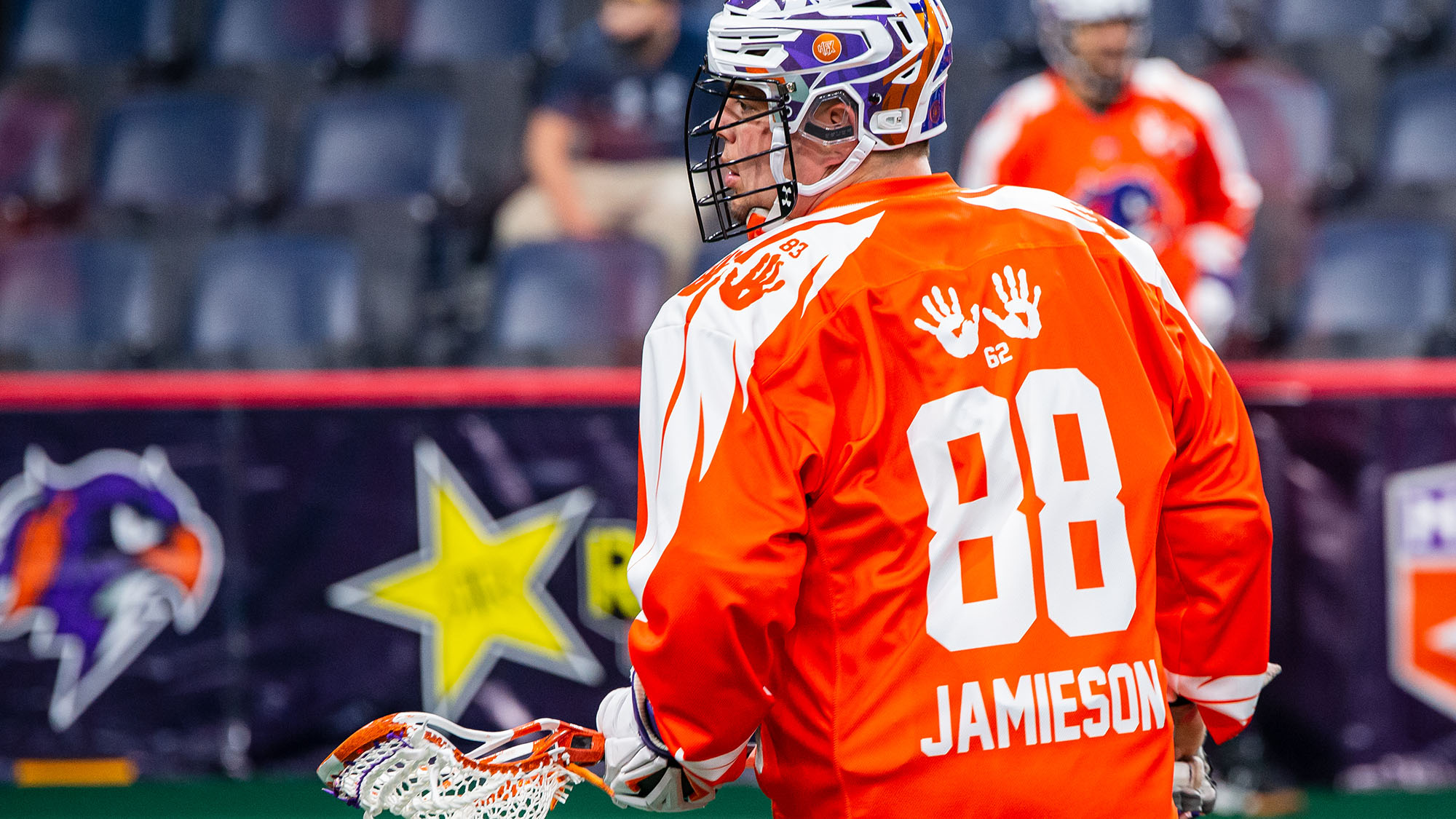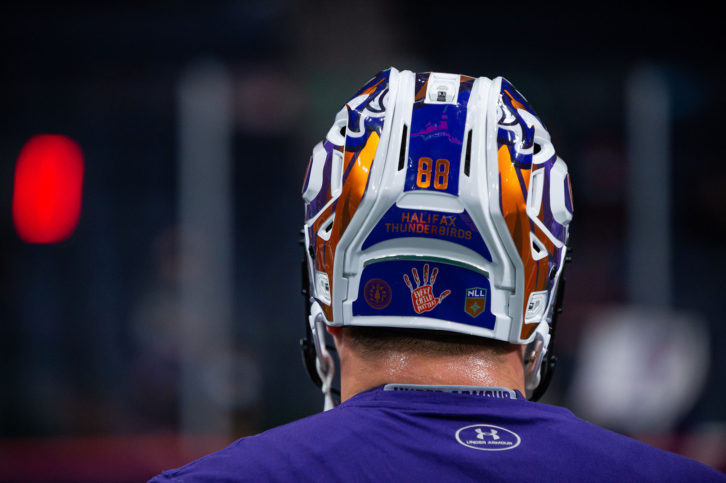Halifax Thunderbirds spark reconciliation movement in National Lacrosse League
Players pay homage to residential school survivors through their uniforms

caption
Cody Jamieson warms up in his Every Child Matters jersey with his grandmother's handprints above his number before the team's home opener on Dec. 4.When he was growing up, Cody Jamieson’s grandmother didn’t say much about residential school.
“But over the past couple years she started talking about her time at The Mush Hole and I think that’s helped her let go of some of those ghosts and traumas,” Jamieson said.
Donna Longboat, Jamieson’s grandmother, is a survivor of Canada’s oldest residential school, The Mohawk Institute at Six Nations in southern Ontario, better known as The Mush Hole.
Now she is being honoured by the Halifax Thunderbirds along with her fellow survivors and those who didn’t make it home.
Longboat’s been watching her grandson, now the Thunderbirds’ team captain, play lacrosse since he was a kid. Jamieson said she was a little bit taken back when he asked her if she was interested in having her handprints on the back of the Thunderbirds jersey for their home opener.
Thunderbirds home opener jersey
The Thunderbirds donned special Every Child Matters jerseys in their home opener on Dec. 4, when Halifax’s squad downed the visiting Saskatchewan Rush in an overtime thriller.
Equipment manager Dave Sowden said the commemoration jerseys may make a return this season.
“If the lacrosse gods see it as we need a win and we need to wear those jerseys, then hopefully we got some of the survivors on our back with us,” Sowden said. “That’s the mentality we have.”
Last night, we played for something much larger than ourselves 🧡#EveryChildMatters pic.twitter.com/mc7tFWF1WS
— Halifax Thunderbirds (@HFXThunderbirds) December 6, 2021
The shoulders featured elongated feathers to honour the residential schoolchildren who died. In addition to Longboat’s handprints, those of Thunderbirds owner Curt Styres’s mother and aunts, who are all survivors, were also featured on the jersey.
Thunderbirds lead Every Child Matters movement
The team will sport special Every Child Matters decals on their helmets all season.
They won’t be alone.
The design conceived by Styres and Sowden will be used by all teams in the National Lacrosse League (NLL) as part of a program to celebrate the residential school survivors and honour those who died.
“Lacrosse is an Indigenous sport, and that game wouldn’t exist today if it weren’t for some of their survivors who came out of residential schools,” Sowden said.

caption
The Every Child Matters decal on the back of Cody Jamieson’s helmet.Between the late 1800s to 1996 about 150,000 Indigenous children in Canada were taken from their families and forced to attend Christian boarding schools. The goal of these schools was to eliminate Indigenous language and culture and replace them with settler beliefs.
The Truth and Reconciliation Commission conservatively estimates between 4,000 and 6,000 students died as a result of abuse, lack of medical attention, disease and suicide.
Jamieson said it was no surprise the Thunderbirds kickstarted reconciliation efforts in the NLL. Styres is the only Indigenous owner in the league and multiple members of the organization have relatives who went through the residential school system.
The Creator’s game
Jamieson said he believes lacrosse is a fitting platform to push the Every Child Matters movement.
“I think it kind of fits well that we were the first professional team to do something along these lines, using the Creator’s game to further the movement,” Jamieson said.
Many Indigenous nations refer to lacrosse as the Creator’s game. Jamieson said every tribe has their own stickball game, but modern lacrosse is from the Haudenosaunee (Iroquois) nation.
“It was a gift given to us from our Creator … for his enjoyment. This is what he enjoyed watching,” Jamieson said.
Jamieson said the Creator gave lacrosse as a form of medicine to scare sickness away from the tribe.
“Your enjoyment of the game is ultimately making the Creator happy, which may in turn make you happy and makes the people watching happy,” Jamieson said. “That’s the traditional meaning behind the game that we play.”
Sports as a form of activism
Sowden said sports is an effective way to spread awareness to a large audience about the trauma Indigenous people endured during Canada’s residential school era and the systemic issues they face today.
The Thunderbirds-inspired decal isn’t just being seen by lacrosse fans.
Sowden said Chris Mattes, New England Patriots director of player operations, had the Every Child Matters decal on his shoes during their primetime NFL game against the Buffalo Bills on Dec. 6.
“It’s important that people are finding out the quote-on-quote true history of Canada and Canada’s native people,” Sowden said.
Residential school survivors and their families can call a 24-7 National Indian Residential School Crisis Line at 1-866-925-4419.
About the author

Will McLernon
Will McLernon is a journalist with The Signal. He is currently finishing up his Bachelor of Journalism (Honours) degree with a minor in International...
